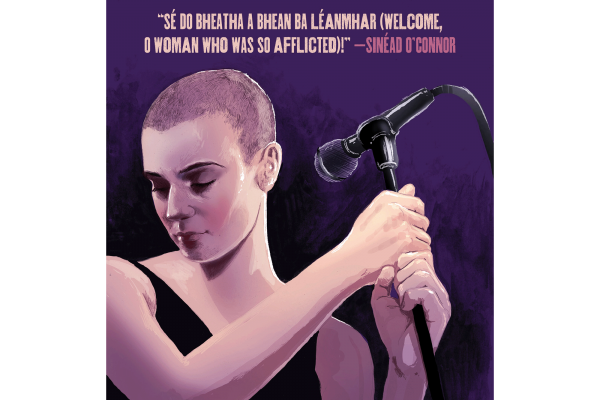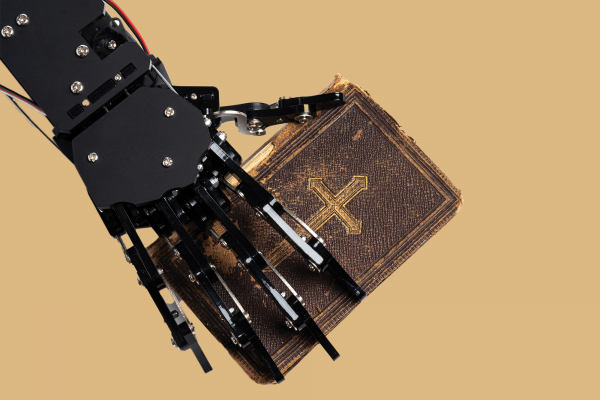This week, conservative pundit Laura Ingraham announced that President Donald Trump would be hosting the young men from Covington Catholic who attended the March for Life, where they got into an altercation with participants in the Indigenous People’s March. It’s unclear whether the administration has extended an invite, but Trump has taken to Twitter to voice his support for the young men. He’s also made clear over the course of his presidency and campaign his disregard for the voices of Indigenous people — whether by slashing the size of Bears Ears National Monument, greenlighting pipelines that impact Native lands, or using racist and derogatory terms to instigate fights with Sen. Elizabeth Warren over claims to Native heritage.
Those attacks have escalated over the last few months, as various media outlets have been reporting on Warren’s decision to enter the race for president. She made the announcement not long after she released the results of her DNA test in order to prove something to Trump, who, by mocking her identity, perpetuates stereotypes toward actual Indigenous women and our history of abuse at the hands of white men.
But here’s the thing. This is about Warren, but it’s also not about Warren.
It’s about DNA tests, but it’s also about more than that.
It’s about politics, but it’s also about identity.
Whether you sit on the side of Trump or the side of Warren, whether you’re a Democrat or a Republican or something else entirely, I have a favor to ask of you: Be sensitive to the Indigenous peoples of the United States right now.
How are Native Americans to be honored when anyone can take a DNA test to “prove” that they are Native, and where do we draw the line?
When Warren decided to take that DNA test, she revealed, once again, that Native Americans are indeed not a monolith.
Just as any people group might react, some Natives agree with what Warren did, some don’t, and some have no opinion at all. Honoring Indigenous sovereignty means that non-Natives should be listening when Natives share their opinions on things that affect us directly. It means listening to writers, activist, and leaders like Ruth Hopkins, Rep. Deb Haaland (D-N.M.), Kim TallBear, Rebecca Nagle, Adrienne Keene, and Nick Estes, who have different opinions on the matter. It means reading their words instead of the endless commentary pieces by white writers who claim to know something about the Indigenous experience. Just as reports on the events around the march in Washington, D.C., centered whiteness, so has the commentary on Warren. When Indigenous peoples are considered in these matters, we are viewed as subjects to be studied and not people with stories, cultures, and experiences that tell the true and oppressive story of America.
Senator Warren has been a sister in the struggle for years for Indigenous peoples' rights, and for all of us who weren't born into the top 1%. The revelation of Senator Warren’s Native American ancestry is significant for her personally, and I join her in celebrating her ancestry
— Deb Haaland (@Deb4CongressNM) October 15, 2018
Native American DNA (despite the shakiness of DNA tests in general to prove “race”) does not mean you are “Native American.” Indigenous people are nations that select & determine their own membership, based on their own customs not DNA tests. No one claims Warren. https://t.co/ol7L3UslzT
— Nick Estes (@nick_w_estes) October 15, 2018
Also, some may read this as an attack Warren. It's not. It's an attack on eugenics, racist science, and the utter lack of understanding of Indigenous nations.
— Nick Estes (@nick_w_estes) October 15, 2018
In fact, Kim TallBear has written an entire book on the topic of DNA testing called Native American DNA. Adrienne Keene, Rebecca Nagle, and Joseph Pierce compiled a list of resources called "SYLLABUS: ELIZABETH WARREN, CHEROKEE CITIZENSHIP, AND DNA TESTING,” available to anyone who is interested in educating themselves on the issue.
Warren taking a DNA test affects the ideas of kinship and belonging for Native peoples, and she has yet to apologize for any possible harm she’s caused. As an enrolled citizen of the Potawatomi Nation, I know that I belong to a people in Shawnee, Okla., and to the broader Potawatomi people of the Great Lakes region of the United States.
If I belong to my people, I also belong to our history of forced removal from the Great Lakes to Kansas. I belong to our history of moving to Oklahoma, our history of assimilation and oppression, and the toxic stereotypes that followed and continue today. We are kin. We belong to one another. A DNA test hasn’t told me this, and it never will, and the focus of my identity shouldn’t be on my racial makeup. What I need right now is for non-Native peoples, for the church, to listen, to pay attention, and to decide not to put a political party or a fight for feminism before the actual work of caring for and respecting Indigenous peoples.
Rebecca Nagle says in a piece on Warren, “If Democrats choose to ignore or deflect the concerns raised by Native advocates and a tribe, they will add to this already troubling dynamic.” It’s important to note that just because someone claims to be liberal does not mean they should claim to be “woke,” as I have seen time and again in progressive Christian spaces. When it comes to the treatment and perpetuated stereotypes of Indigenous peoples in America, everyone needs to do better. Everyone needs to make an effort to listen. Everyone needs to join in the work of decolonizing political and faith spaces.
If we claim to follow Jesus, who stood up against the oppressive empire of his day no matter the cost, what are we willing to do to stand up to our own empire? What is the church willing to do to stand up against oppressive systems that hurt Indigenous peoples, the original peoples of America? What is the church willing to do when politicians refuse to apologize for the harm they cause, and is the church willing to be quiet and listen when those on the outside speak up for themselves?
Only time will tell, and we will continue to see in the next year what it looks like to be the church in a continually toxic political climate. If that reality is that Indigenous peoples are ignored and our sovereign kinship identities traded for DNA tests and stereotypes, it will not only be the original peoples of this land that grieve, but the very heart of God.
Got something to say about what you're reading? We value your feedback!







